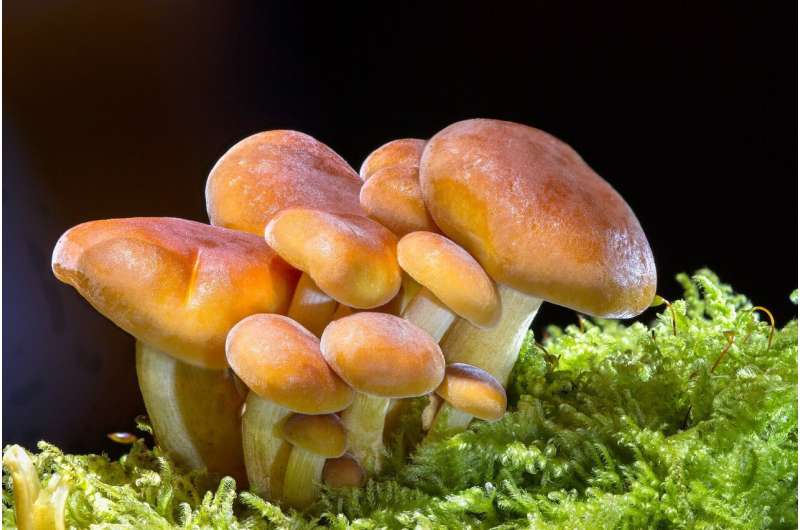Rural communities in Québec are embracing 'mushroom tourism' to boost local economies

, is becoming increasingly popular as travelers seek out more nature-focused experiences. This unique tourism niche combines guided mushroom foraging with culinary traditions and rural culture to offer travelers an experience distinct from more traditional forms of tourism.
Mycotourism has to boost local economies, particularly in rural areas, while also fostering a deeper connection between visitors and nature. When it is practiced sustainably, it can also by sharing traditional mushroom harvesting methods and ecological knowledge with the public.
The growing popularity of mycotourism reflects a larger shift toward and . Forest-related tourism includes activities like foraging and product harvesting as travelers seek closer connections to nature, while gastronomy tourism involves travelers seeking out culinary experiences.
Rural tourism, too, has seen growing interest in recent years. United Nations Tourism and mycotourism aligns with this focus, as it is tied closely to rural economies, often involving small, seasonal businesses that face seasonal and visibility challenges.
In response to this trend, the Québec government has revealed a to establish the province as a premier culinary destination with a promising future. As mycotourism grows, it aligns with Québec's broader culinary and tourism goals.
Mycotourism: A brief overview
While mushroom foraging has long been practiced informally in many parts of the world, it's now evolving into a formalized tourism industry, led by local experts to ensure safety. Countries such as , , , and are current pioneers in this market.
Spain, where mycotourism originated, leads the way with its well-established "micoturismo" industry, especially in the .
In Canada, thanks to its rich natural landscapes, including vast forests and diverse ecosystems. The province has seen increased demand from both local and international visitors.
The Québec regions of and , in particular, have emerged as leaders in North American mycotourism. This surge, which was , has positioned these regions as key destinations for mushroom enthusiasts.
The number of amateur mycology circles and their members has also , reflecting a in wild mushrooms.
However, despite its growth, mycotourism remains relatively unfamiliar to many Canadians. It signals an untapped opportunity for the tourism industry in the country.
Overcoming industry challenges
The mycotourism sector faces several challenges, including fragmented initiatives, which presents challenges in areas like promotion, infrastructure and knowledge sharing.
There is a need for better co-ordination . In Québec, these stakeholders include regional tourism associations, sectoral tourism associations like .
Establishing a unified platform or network for mycotourism stakeholders could facilitate the exchange of best practices, improve promotion and support its sustainable growth.
By closely monitoring new initiatives, researchers, entrepreneurs and tourism professionals can better understand the challenges and opportunities in this field.
This collaborative approach would identify potential partners for future collaborations, highlight resources and tools and ensure the development of this industry respects all the stakeholders, including Indigenous communities.
Our mushroom tourism research
sheds light on the growth of the mycotourism industry in Québec. Through an in-depth environmental scan, we identified 57 providers across the province, with the majority concentrated in Mauricie and Bas-Saint-Laurent, including the region of Kamouraska.
We found that most mycotourism businesses in Québec are micro or very small enterprises, which means collaboration and networking are both essential for supporting their growth and sustainability.
The activities offered by these providers fell into five main categories:
- Events and learning: Includes festivals, conferences, training sessions and courses.
- Culinary experiences: Features culinary workshops and tasting sessions.
- Guided tours and hosting: Encompasses guided tours and group hosting events.
- Nature exploration and foraging: Includes guided, self-picking foraging expeditions.
- Accommodations with mushroom picking: Lodging experiences that allow guests to participate in mushroom picking during their stay.
In addition, our study identified four types of enterprises in the sector. These ranged from solo ventures specializing in niche activities, to versatile solo ventures with a diverse range and experiences and services, to slightly larger businesses focusing on targeted services.
It's clear that Québec's mycotourism sector is dynamic, with businesses continually developing new and innovative offerings. The wide range of experiences offered are designed to attract new segments of tourists interested in agritourism, gastronomy or other unique accommodations.
Unlocking mycotourism potential
As mycotourism continues to grow, it is crucial for small-scale initiatives in this sector to gain stronger support and recognition from tourism authorities, regional organizations and government agencies.
Without this support, these businesses may struggle to overcome challenges like limited visibility, fragmented efforts and insufficient resources. If these challenges are not addressed, it could hinder the growth of the sector and its ability to contribute to local economies and rural development.
With its vast forests, rich biodiversity and developing agritourism and gastronomy sectors, Canada is well-positioned to establish itself as a top destination for mushroom enthusiasts. But to fully realize its full potential, Canada must create an environment that promotes innovation, collaboration and investment in mycotourism.
Provided by The Conversation
This article is republished from under a Creative Commons license. Read the .![]()





















